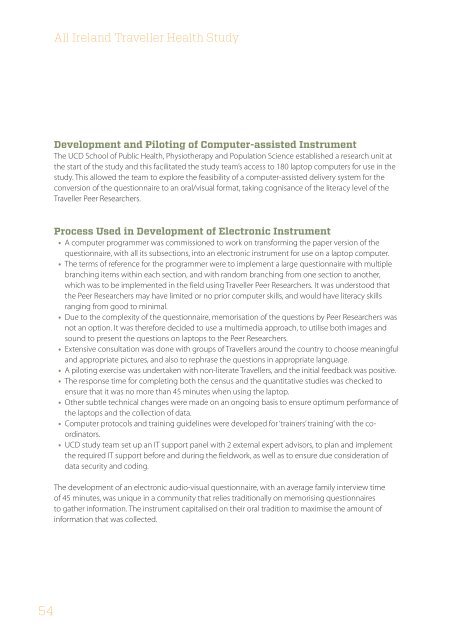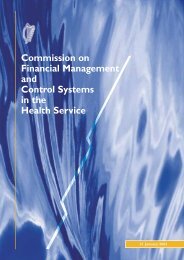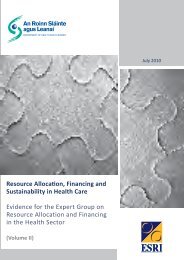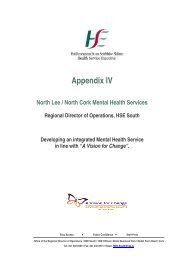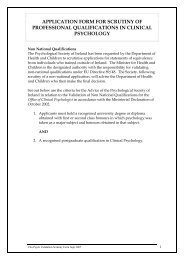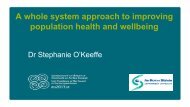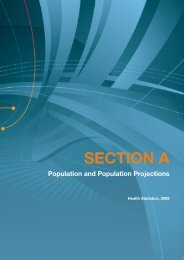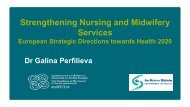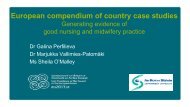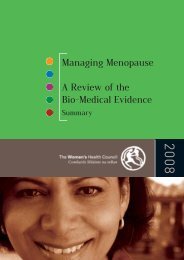All Ireland Traveller Health Study Our Geels - Department of Health ...
All Ireland Traveller Health Study Our Geels - Department of Health ...
All Ireland Traveller Health Study Our Geels - Department of Health ...
Create successful ePaper yourself
Turn your PDF publications into a flip-book with our unique Google optimized e-Paper software.
<strong>All</strong> <strong>Ireland</strong> <strong>Traveller</strong> <strong>Health</strong> <strong>Study</strong><br />
Development and Piloting <strong>of</strong> Computer-assisted Instrument<br />
The UCD School <strong>of</strong> Public <strong>Health</strong>, Physiotherapy and Population Science established a research unit at<br />
the start <strong>of</strong> the study and this facilitated the study team’s access to 180 laptop computers for use in the<br />
study. This allowed the team to explore the feasibility <strong>of</strong> a computer-assisted delivery system for the<br />
conversion <strong>of</strong> the questionnaire to an oral/visual format, taking cognisance <strong>of</strong> the literacy level <strong>of</strong> the<br />
<strong>Traveller</strong> Peer Researchers.<br />
Process Used in Development <strong>of</strong> Electronic Instrument<br />
• A computer programmer was commissioned to work on transforming the paper version <strong>of</strong> the<br />
questionnaire, with all its subsections, into an electronic instrument for use on a laptop computer.<br />
• The terms <strong>of</strong> reference for the programmer were to implement a large questionnaire with multiple<br />
branching items within each section, and with random branching from one section to another,<br />
which was to be implemented in the field using <strong>Traveller</strong> Peer Researchers. It was understood that<br />
the Peer Researchers may have limited or no prior computer skills, and would have literacy skills<br />
ranging from good to minimal.<br />
• Due to the complexity <strong>of</strong> the questionnaire, memorisation <strong>of</strong> the questions by Peer Researchers was<br />
not an option. It was therefore decided to use a multimedia approach, to utilise both images and<br />
sound to present the questions on laptops to the Peer Researchers.<br />
• Extensive consultation was done with groups <strong>of</strong> <strong>Traveller</strong>s around the country to choose meaningful<br />
and appropriate pictures, and also to rephrase the questions in appropriate language.<br />
• A piloting exercise was undertaken with non-literate <strong>Traveller</strong>s, and the initial feedback was positive.<br />
• The response time for completing both the census and the quantitative studies was checked to<br />
ensure that it was no more than 45 minutes when using the laptop.<br />
• Other subtle technical changes were made on an ongoing basis to ensure optimum performance <strong>of</strong><br />
the laptops and the collection <strong>of</strong> data.<br />
• Computer protocols and training guidelines were developed for ‘trainers’ training’ with the coordinators.<br />
• UCD study team set up an IT support panel with 2 external expert advisors, to plan and implement<br />
the required IT support before and during the fieldwork, as well as to ensure due consideration <strong>of</strong><br />
data security and coding.<br />
The development <strong>of</strong> an electronic audio-visual questionnaire, with an average family interview time<br />
<strong>of</strong> 45 minutes, was unique in a community that relies traditionally on memorising questionnaires<br />
to gather information. The instrument capitalised on their oral tradition to maximise the amount <strong>of</strong><br />
information that was collected.<br />
54


